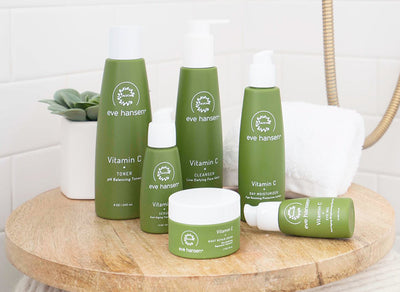
You might think of vitamin C as a good ol' citrusy immunity booster, shelved in your medicine cabinet for when you need to kick a cold.
But when applied topically, it's a powerful addition to an anti-aging skin-care regimen. Vitamin C, also known as ascorbic acid, is key to the production of collagen, a protein that aids in the growth of cells and blood vessels and gives skin its firmness and strength. Vitamin C also helps create scar tissue and ligaments, and it helps your skin repair itself.
How does the vitamin C magic work? When applied to the skin directly, the antioxidant neutralizes free radicals (atoms or molecules with an unpaired electron) that age you. When a free radical steals an electron from one of the proteins in a strand of collagen, it creates a tiny break in the strand. The more breaks you retain, the more damage you'll see as skin begins to sag and wrinkle.
Since vitamin C is an electron donor, it helps reverse and prevent signs of aging. Use it to keep skin firm and youthful and protect yourself from UV rays. Vitamin C also lightens pigmentation and brightens over all skin tone.
Most vitamin C products on the market range from 5% (considered fairly weak) to 20%. 20% is the highest amount you should put on your skin because if you go any higher, your skin will not be able to absorb as much of the antioxidant. If a product doesn't have the concentration of vitamin C listed, you can always contact the company for more information.
It usually takes a round 6 months of consistent vitamin C use to start seeing results.
Side Effects and Precautions
Despite all the raves and glowing reviews, vitamin C products don't work for everyone.
For some people, vitamin C can cause redness and stinging upon application. Usually your skin gets used to the treatment and this kind of irritation will subside. However, sometimes you have to downgrade to a less potent C serum to make it more tolerable. Others even experience allergic reactions, such as itchy red bumps, and cannot use vitamin C at all. It all depends on your skin and how it handles the antioxidant. Vitamin C is a powerful antioxidant, but like with anything you put on your skin, make sure you look at a product's ingredient list first and read some reviews. Pick a C serum that is stable and at the proper pH and you'll be on your way to preventing wrinkles and brightening your skin.


